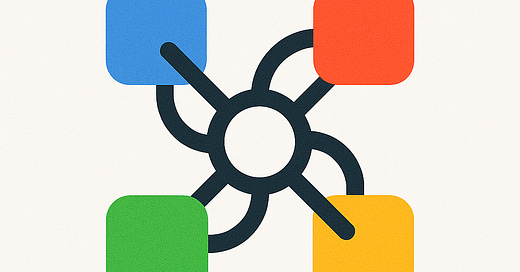When Anthropic introduced the Model Context Protocol (MCP), they set out to redefine how LLM-powered applications could connect to third-party services. MCP established a clear standard: LLM apps act as clients, while external tools and APIs could become MCP servers. This was a significant step toward making AI applications more extensible and useful in real-world workflows.
The Local Phase: Powerful, but Isolated
Initially, everything ran locally. Developers would write MCP servers that operated as background processes on their own machines. These servers worked much like traditional local daemons, providing value-but only within the confines of a single device. This was reminiscent of the pre-internet era, where local terminals and files were the extent of interoperability.
For developers, this approach was straightforward, but it came with real limitations:
Setup friction: You needed to install dependencies, configure environment variables, and manage authentication (API keys, OAuth clients, etc.).
Limited audience: Non-technical users found the process daunting.
Security risks: Credentials sat around, increasing the risk of leaks.
Despite these challenges, there was clear demand for richer integrations, even with the manual setup.
Hosted MCP: Removing Local Barriers, Introducing New Concerns
The next logical step was hosted MCP servers. Instead of running everything locally, some services began offering hosted endpoints. This allowed LLM clients to connect over the web, making integrations more accessible.
However, this approach introduced new challenges:
Trust: How do you know the hosted server is secure? Are your credentials being handled properly?
Complexity: Many hosted solutions still required manual configuration and authentication, which remained a barrier for most users.
Remote MCP: Trust and Simplicity at Scale
The major breakthrough came with Remote MCP. Here, the third-party provider hosts the MCP server themselves. This shifts the trust model: users can now rely on the official domain (e.g., paypal.com vs. a random third party) and established authentication flows.
Key improvements:
OAuth integration: Authentication is handled securely, directly with the provider.
Reduced friction: End users don’t have to manage local servers or credentials.
Scalability: Providers can offer integrations to all users, not just those comfortable with local setup.
Cloudflare’s Role: Lowering the Barrier to Entry
Cloudflare accelerated adoption by making it easy to deploy secure, authenticated MCP servers. Their tooling allows developers to wrap an existing API and deploy a Remote MCP server (with OAuth) in a matter of hours. This has made it feasible for any SaaS provider to offer official, secure integrations with LLM-powered apps.
Early adopters like PayPal, Neon, and Sentry demonstrated the benefits of this model. Now, building and maintaining a Remote MCP server is both practical and secure.
The Big Launch: May 1st, 2025
On May 1st, Cloudflare and several major tech companies announced a wave of new Remote MCP servers, including:
Linear
Intercom
Square
Atlassian
Asana
Plaid
This coincided with Anthropic’s launch of a streamlined integration experience for Claude.ai. The terminology has shifted from “MCP” to “Custom Integrations,” reflecting a broader vision and improved usability.
The New Integration Flow: Simplicity for End Users
The process for adding an integration is now as simple as:
Go to settings in Claude.
Paste the Remote MCP server URL (integration URL).
You’re connected-authentication and trust are handled by the provider.
This is a significant improvement over the old model and opens up integrations to a much wider audience.
What’s Next?
Broader access: Expect integrations to roll out to Pro and eventually Free users.
More providers: With the barrier to entry so low, more SaaS platforms are likely to offer Remote MCP servers.
Find remote MCP servers here
In summary: MCP has evolved from a local, developer-focused area to a robust, cloud-native standard for integrating LLM-powered apps with third-party services. Thanks to Remote MCP and Cloudflare’s ecosystem, secure and official integrations are now within reach for any provider-and any user.




